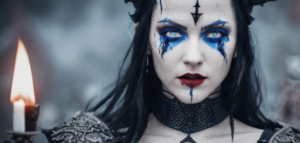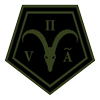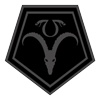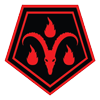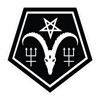Blood for Odin
A work of fiction by Thomas LeRoy
From out of a blue-black night sky painted with faint silver clouds like stripes across the Infinite, the Moon’s radiant glow reflected upon the sea’s subtle ripples like thousands of bobbing and dancing crystals. The crisp salt air was still and all that could be heard was the faint crash of waves, the crackle and pop of torches, and the low muffled groans of the dying.
On a small rocky isle off the western coast of Scotland, thirty grim torchbearers clad in black chain mail and furs, gathered in a wide circle around a rowan tree. In the tree’s higher branches were perched a pair of ravens, while in its lower branches hung three bound men, souls slowly being squeezed from flesh as nooses tightened.
Standing before one of the hanged men was a tall, hooded woman clad in flowing layers of black, her garb covered in red runes, staves, and sigils. About her neck hung necklaces of various lengths with amber and glass beads, bear claws, and human bone. In her right hand, she clutched a bejeweled dagger, and as she brought the blade up to full red lips to kiss, the torchbearers began to hum, low and guttural, from deep in their throats.
“Just as Odin hung from Yggdrasil”, the sorceress said, now raising the dagger above her head, “so shall thee. This honor I bestow upon thee.”
She stepped toward the man hanging closest to her, reached up, and drove the blade into his naked belly. The hanged man stiffened as she pulled the dagger with both hands across his gut. Flesh parted, and like a great mouth vomiting, out spilled red blood and steaming blue/pink viscera. As much of the contents splashed upon the rocky earth, the woman stepped back. After a moment she removed her hood, revealing a head of long black hair and an elegant visage with cold blue eyes the color of the North Sea. When all life had departed the body, she reached forward and dipped a finger into the sanguineous gore. With the dripping finger, she drew the Thurisaz rune upon her forehead and began to chant Odin’s many names.
As she completed the sacred naming the humming stopped and the two ravens, who had been watching from the tree-top, took to flight, circling the tree in opposite directions before alighting at the feet of the sorceress.
“So it is done,” she said. “Blood for Odin.”
“Tug harder, you dogs!” the ship’s captain barked as his four slaves pulled a fishing net onto a high-prowed, broad-waisted galley. “Get that net in if you want to eat!”
“Aye, Captain!” shouted one of the slaves, a short, bald man with a gap-toothed grin and a deeply scarred pink pate.
Even though it was four to one, the thought of overpowering the captain never crossed the minds of the slaves. This was not only because of the wrought-iron collars about their necks pronouncing their status but also due to the psychological chains placed upon them, chains heavier than iron.
Another of the slaves, a lean man with long hair and a beard the color of pale copper, gritted his teeth as his muscles strained. It was a wet, gray morning and the drab brown wool he wore was soaked, as was the wool cap on his head. Even though his face was twisted with the strain, his green eyes were almost blank, expressionless. Where there was once a proud Pict, now stood a being reduced to a cold, empty husk. That flame that makes one alive was now but a flicker.
“Harder, I say!”
“But the infidel here,” said the bald slave as he nodded toward the copper-haired man beside him, “is not putting his back into it!”
“Come now, Heathen!” said another, a wiry, unpleasant-looking creature with a dark, rodent-like aspect. “You want your bowl of porridge, don’t you?”
And the fourth, a stocky wide-eyed mute with swarthy Mediterranean features, nodded and chuckled as he tugged.
“Enough!” said the captain, an oversized, gray-bearded Scot of Dal Riada. “Shut your mouths and don’t lose any of my fish!”
With one last tug, the four hauled the bulging net over the side and onto the deck, where out spilled hundreds of fish, like shards of living silver, flopping spasmodically.
“Now, you know what to do!” said the captain. “Into the barrels with them!”
As dusk fell upon the Hebrides the fishermen completed their duties before anchoring off the shore of a minor, barren island. There, under a blood-red sunset, they settled in for the night instead of making the long haul back to the coast. The seas were calm, and the weather not unbearably cold, for the Summer Solstice was nearing.
The one they called “Heathen” watched the others warily as he sat on his oarsmen’s bench spooning mushy oats into his mouth. He was relatively new to this vessel, having been purchased by the captain from another slave master but a fortnight past. His total years in bondage, he was not sure. Was it ten years, twelve years, or twenty years? Time meant nothing. Where once keeping track of the days, the moons, and the seasons was his duty, now one day ominously dissolved into another, sometimes slowly, sometimes quickly.
He had been a druid, the last of his kind, and he made a conscious effort not to log the days, for that was of the past, and in the past lingered the shadows of Death. He dared not dwell upon his memories because the past was red blood on white snow and the black of scorched ruins. The past was his slaughtered daughters, brother, and kin, slaughtered on the night the Dal Riadans came.
His people had been the last of the Old Ways, living on the border of Pictland and Dal Riada. Besides a few minor clashes with the Scots to their west, they lived in relative peace with their neighbors until eventually, the Dal Riadans had had enough of their presence. The gods of the past were seen as a threat to the new god, the “White Christ”. These pagans were a blight amongst the otherwise civilized kingdoms of Northern Britain. And with the new threat of the infidel Northmen, the idea of unbelievers upon their border was more than they could take. So on a cold winter’s night, they came from Dunadd with sword and flame to lay waste to the vile heathens.
The Scots were silent, quick, and numbered in the hundreds, swarming over the wooden palisades of the dun, killing with the blind madness of devout zealotry. The women, children, and elderly that could not fight or flee into the surrounding woodland were slaughtered, while Heathen and the other men, along with some of the women, battled for their survival.
The horror of that memory! The screams, the crackle of flames, and the sound of collapsing timber. There was also the final image he remembered from that night, which was indelibly imprinted on his psyche, just before he was struck down by a blow to the head. That final image was the chieftain of his people, a scene of savage fury, a fury that could only arise from the soul of a Pict. The man was a brutal silhouette against the flames of the burning drinking hall slaying Dal Riadans with a sword forged in the frozen north. Whether he had perished that night, he did not know.
Heathen awoke the next morning covered in a light dusting of snow and ash, his left eye glued shut from dried blood, his head throbbing. With his right eye, he spied the black, smoldering ruins and the hacked bodies, limbs, and entrails. So many butchered, mangled bodies, he could not tell who was who. A number of the Scots were laughing as they watched two dogs compete in a tug-of-war over some poor soul’s small intestine. Most of the Scots, though, milled about, searching through the horrific rubble for something of worth. He was of worth, he guessed when a pair of them noticed he was amongst the living. They grabbed him by the ankles and dragged him across the frozen, scorched earth, depositing him in the back of a cart. Thus began his benefaction of forced servitude.
There was a chill in the air that night off-shore of the islet as clouds rolled in covering the moon and stars. Heathen lay on his bench under a thick woolen brat he used as a blanket, while a burlap sack filled with his few personal items served as a pillow. Looking straight up past the mast, he saw two birds circling the boat, black against a sky of dark slate. Strange, he thought, they didn’t appear to be sea birds, more like crows or ravens. The night was quiet but for the knocking of the rigging and the light splashing of waves against the hull. But he knew that wouldn’t last because the captain, drunk in his hammock at the stern, would begin snoring. The captain, as slave masters went, was a relatively decent man having shown little sign of malevolence. He was a man after coin, and the sea was filled with that which lead to it. The three other members of this reluctant crew were a different story. Balbh, the mute, slept on the other starboard bench next to Heathen, while Radan was across from Balbh and Maol across from Heathen. All three were irredeemable cretins, criminals sold into slavery, their true nature amplified due to the captain’s leniency. And when the captain began snoring, they seized the initiative.
“Are we awake, Heathen?” came a low voice.
Heathen sat up to see Moal and Radan standing across from him, while Balbh was to his right, staring down with that mute, idiotic grin.
“It’s time to get to know you better, you lazy bastard,” Moal said then licked his lips.
Now, those few words spoken by the man called Moal were but a subtle rendition of intimidation, if you will. But he may have selected other words — more meaningful words — if he had known that they would be the last he would ever speak, for his head nearly exploded as an ax, thrown from out of the black of night, buried itself into the back of his skull.
“Northmen!” yelled Radan.
As if the night-shrouded sea had birthed mail-clad demons, bearded Norsemen swarmed the galley from their black, dragon-prowed longship which had silently maneuvered itself beside the fishing vessel.
Heathen leaped to his feet, and like removing a hatchet from a stump, yanked the ax from Moal’s head. He swung at the invader nearest to him, ax blades clashing, creating sparks, again and again.
Why he fought with an unbridled passion for life, he was not sure for hadn’t the gods forsaken him? Heathen’s fighting style was not that of a trained weapons man, but one of instinct, of memory found in the genes of the Pict. And it was that instinct usurping the ever-present defeatism that kept him alive.
The captain, now awake, and with a gaff in his hand, lumbered forward like a bear with one elongated claw. He drove the hook into the eye of an attacker, while at the same time that Norseman buried his ax in the captain’s chest. The Norseman tore off his spangenhelm, then let forth a howl of pain and rage as he yanked the gaff out of his head, leaving a bloody cavity, and an eyeball with a red ocular nerve hanging at the end of the hook. The captain, wide-eyed, and coughing up blood, staggered a few feet, pawing at the blade in his shattered ribcage, before tumbling overboard.
“Thrir!” yelled one of the Norse. “ Thrir!”
With that call, the tone of the attack shifted and Heathen found himself now overcome by the Norsemen, not with their axes but with hands, grabbing him, his weapon torn from his grip. Had they been toying with him? Was the fight but play? Large hands had him by the arms, back of the neck, and hair. He could feel the Norsemen’s breath on the side of his face. A pair of them grabbed each of his legs and lifted. He could see Radan and Balbh, still alive, in similar situations. They were being hauled, like sacks of meal, from the fishing vessel and passed onto the longship.
The trio was carried down the center of the vessel before being deposited upon the deck before a black-clad, hooded woman. The woman was seated at the bow upon a large wooden chair, a chair carved with knotwork, and interlace patterns. A pair of ravens were perched atop that high-back chair, their small black eyes staring intently, while two huge, black-bearded Norseman stood on either side of the woman, the one on her right holding a torch, the one on the left, a spear.
“Greetings,” she said softly. “I am Solveig Skulidottir and you are welcome upon my longship.”
“You speak our language,” said Radan as he got to his feet, Balbh beside him, Heathen behind, with the Norsemen crowded all about, armed, silent, and motionless, save for the one tending to his bloody empty eye socket.
“I speak many tongues,” said the woman. Her tone was calm, almost comforting.
“What do you want with us?” said Radan.
She smiled. “I’ll ask the questions, and I’ll begin with you,” she said, pointing at Balbh. She gave a slight nod to one of her many men standing behind the three slaves. That Norseman, holding a small hammer, stepped forward, took hold of Balbh’s slave collar, and knocked the pin from the collar, freeing it from around the mute’s neck. He did the same to the other two. The man then tossed the collars into the sea.
“Thank you, M’lady,” Radan said as he rubbed his neck. “But my friend here, can’t talk. Got his tongue torn out. No one knows why on account he can’t tell us!” he said, laughing.
She nodded as she chuckled. “All right, does he have a name?
“We just call him ‘Balbh’,” Radan said.
“Well, I have a question for our friend Balbh that mayhap you can answer,” Solveig said.
“Anything, M’lady,” Radan said with a rat-like grin.
“Good,” she said. “What is his worth?”
“What do you mean? Like in coin?” said Radan.
Solveig shook her head. “No, what is his worth as a man? A person?”
“I don’t understand,” said Radan. “We are slaves so our worth . . . Do you mean like in strength?”
She shrugged. “It could be. Could be many things.”
“Well, Balbh here is very strong, can pull an oar better than any man I know,” Radan said, as he patted Balbh on the shoulder. “He may look like he hasn’t two wits about him, but I’ll tell you Balbh here is a fast learner. Smarter than most.”
Solveig nodded. “Good,” she said. She looked at another Norsemen standing behind the captives and made a subtle hand gesture. That man stepped forward and grabbed Balbh. A confused look fell upon the mute’s face as the man ripped off Balbh’s tunic, then bound his wrists behind his back before seating him upon the foremost bench.
“What’s this all about?” Radan said.
“It’s all part of the procedure,” Solveig said. She smiled. “Now, my loquacious friend, what is your name, and what is your worth?”
Radan cleared his throat, feeling a bit uncomfortable. “I am Radan, M’lady, and I am a rather fine cook . . . also I have a singing voice unmatched in all of Northern Britain,” he said with a slight bow.
“Well, give us a song then, Master Radan,” said Solveig. “If you’d please.”
Radan nodded, cleared his throat again, and in a smooth tenor began singing of a fair noblewoman of Northumbria and her dying lover. When he had completed, Solveig applauded.
“You do have a fine voice, Master Radan,” she said. She made that same gesture again and the same Norseman came forward, grabbed Radan, ripped off his tunic, bound him, and seated him beside Balbh.
“Have . . . have we offended you, M’lady? Radan said, confused.
“Quite the contrary,” Solveig said. “You have truly revealed to me your worth.” She looked up at Heathen. “Now, whom might you be, and what is your worth?”
“My name is Heathen,” he said in a low voice.
“No, it isn’t,” Solveig said. “What is your name?”
There was a long pause. “I was called Turlogh mac Ragnall,” Heathen said. It had been years since he said those words — his birth name. It felt odd on his tongue.
“Ragnall?” Solveig said, confused. “How did your father get a name like Ragnall? Are you Norse?”
Heathen shook his head. “I am Pict. How my father got his name, I know not.”
Solvieg sighed. “All right. So, why did you call yourself ‘Heathen’? Are you not a Christian?”
Again he shook his head. “I was a druid, follower of the Old Ways.”
Solveig sat forward. “Really? I am intrigued. Tell me more,” she said.
Heathen shrugged. “What is there to tell?”
“Much,” she said. “I thought all you Britons were followers of the Christ.”
“Not all,” said Heathen.
“Why not you?” Solveig said.
“My people — my tribe — held true to our ancient traditions,” he said. “I think it madness that any Pict would adopt the faith of the invading Romans.”
“That was long, long ago,” Solveig said. “You still hold a grudge?” She laughed. “Anyway, tell me of your gods, Turlogh mac Ragnall?”
“I have nothing to tell,” he said. “My gods have forsaken me.”
“Impossible,” Solveig said. “That is like saying the winds have forsaken you, or the tides. The gods are what they are. Now, tell me of your gods.”
“I can not tell you of that which I can not see,” Heathen said.
“What do you see then?” Solveig said, her elbows resting on the arms of her chair, her hands steepled under her chin.
Heathen stood silent, staring at the woman. “I see nothing,” he finally said. “Only the Abyss.”
“The Abyss is something,” Solveig said. The Abyss is the primordial depths, the dwelling place of the Thurses, and of Ýmir. See that?” she said, pointing to the longship’s great black sail with a red rune painted on it. “That is the thurisaz rune. That is the symbol of the Abyss, so there is much in those dark depths you are not seeing. Open your eyes.”
“They are open, woman,” Heathen said with a huff.
Solveig shook her head. “No, they’re not. Now, close them, and while they are closed, open that special eye and tell me, tell me what you see.”
“I am done with this foolishness,” Heathen smirked. “Done answering questions. Do whatever it is you’re going to do.”
“I can’t. I must first find your worth, and right about now I am finding none,” Solveig said with a sigh. “There must be three of you. Two are dead and only two have shown their worth. And you,” she paused, staring at the Pict in the glow of the flickering torchlight, “you might have more worth than the other two combined, but it must be revealed to me. I must know it in my heart or Odin will forsake my offering.”
“Come now, Heathen!” Radan said. “Reveal what little worth you have and let’s be done with this!”
“Wake up, you dolt!” Heathen said to Radan but with his eyes locked on Solveig. “Have you not figured it out?”
“What do you mean?” Radan said.
Heathen turned to Radan. “We are the offering!” he said with a grin filled with irony. “We are to be sacrificed to her dark god!”
“Sacrificed?!” Radan said, his brow in a gnarled bunch.
Solveig shrugged. “Did not your god allow his son to be sacrificed?” she said to Radan. “And you,” she said to Heathen. “Do not your people — people of the ‘Old Ways’ — make offerings to the gods?”
“We have, in times of need. Desperate need,” Heathen said.
Solveig put forth her hands, palms up. “Who is to say we are not in desperate need?”
Heathen looked about. “These men of yours do not look so desperate to me.”
“Ah, but there are different kinds of desperation,” Solveig said. “There is the desperate hunger of the soul.” She pointed at Heathen. “I see that in you.”
Heathen shook his head. “You know nothing of me.”
“I know a man in pain when I see one,” Solveig said.
Heathen stood silently glaring at the sorceress. The spear-bearer beside her tightening his grip on his weapon as one of the ravens flapped its wings restlessly.
Eventually, Heathen spoke: “I have lost everything, my home, family, freedom, so do what thou wilt with us.”
“Speak for yourself!” hissed Radan from the bench.
“I have a question, Turlogh,” said Solveig as she reached up and scratched the feathered belly of the restless raven. “If I were to have you thrown overboard would you cry because the sea is wet?” She shook her head. “Fate is cruel. That is the way of things. Of reality. How can a once-mighty druid of the Northern Britons cry over the unchanging natural state of existence?”
Heathen gritted his teeth. “Because everyone I know — everything I know — was slaughtered!”
Solveig sat forward, her brow furrowed. “See that man sitting there,” she said, pointing at Balbh. “He has no tongue, mayhap ripped out as a child to keep him silent after he found his father raping his sister. Who knows? And him,” she said, now pointing at Radan. “That is one of the most repulsive-looking beings I have ever had the misfortune of laying eyes upon, but he has the singing voice of Bragi. Only someone who has experienced pain could sing like that. And they are not the only ones. I was left in the snow at birth by the good folks who brought me into this world, left to die because they needed a boy to work the farm. As fate would have it, I was found by the ‘Mad Shaman’ Skuli Einarsson, who raised me as his own.” She sighed. “Fate has not been kind to any of us.”
“So you venture to find worth just to snuff it out,” Heathen said. It was not a question.
“A sacrifice is not a sacrifice unless it hurts,” Solveig said. “I have felt pain with every offering.”
“Then why do it? And don’t give me that lie about desperation. The truth.”
Her icy blue eyes bore into his green eyes for more than a few long seconds before Solveig finally said: “For true power, the kind of power riches can not buy. I do not want to be one with the gods, no, but instead to truly be as the gods are. As Odin is. I came into this world less than human. Decarded waste. Now I long to be more than human.”
“By killing the innocent?”
“No one is innocent.”
Heathen shook his head. “You’re a fool, woman,” he said with a smirk.
“Good thing my men do not understand your tongue,” she said. “For they would have your head for what you just uttered.”
“And disrupt your plans, your ‘offerings’?”
Solveig smiled. “If I am a fool for searching for worth in the human spirit, then so be it. But in you? I’m not finding it. You’re already dead.”
“Then do me a favor and send me to meet your god so I can spit in his eye!” Heathen said through gritted teeth.
Solveig sat back and pointed. “There, you just did it!” she said with a smile and a nod. “I do believe you’ve finally presented your worth by showing me this, right now. Now I like you . . . so offering you to Odin, that will truly be a personal sacrifice on my part .”
Just as those last few words passed her red lips, the cloud-covered heavens opened with a torrent of rain, sudden and unexpected.
Solveig slowly put her head back, eyes closed, letting the rain fall upon her face. “Thor may be the god of thunder,” she said softly, “but Odin . . . Odin is the god of storms.”
And with that, the fury of the night rose with unbridled madness as blue/white lightning flashed, and the heavens roared like a vast animal, a behemoth of immeasurable power and proportions. Then came a blinding explosion of ball lightning, a violet-hewed blast that destroyed the mast and set the sail aflame which, in turn, came crashing down upon the heads of a number of the Norsemen. The ocean rose and turned suddenly, like the stirring and twisting of a great leviathan awakening from some millennia-long slumber. The carved dragon at the desperate ship’s prow seemed to rear up and bellow as those upon the deck were tossed about, many thrown over the side and into the turbulent waves. Weighed down by their heavy chain-mail hauberks, the Norse, wide-eyed, sank into the inky depths, hands blindly grasping for purchase that was not there.
Heathen, too, was flung overboard. He smashed into the violent waves, gulping mouthfuls of saltwater. He was jostled about, like a desperate rat in a water bucket in the hands of some malevolent child. But once more those instincts kicked in, that innate need to live one more day, or one more hour, or even one more minute. He fought to keep his head above the surface, his arms flailing, his legs pumping. Then his right hand grasped a large piece of wood, a part of the mast, maybe. He pulled it in close and he hugged it, his head turned upward, gasping for air. I will live, he told himself. I want to live!
The glow of a chilled dawn found Heathen upon the shore of a small barren island, not much more than sand and rock, that same island the fishermen had anchored nearby the evening before. All was calm, and placid, as he lay on his back, staring up at wispy, orange/pink clouds upon a pastel blue sky. Two seabirds circled the island high above. Or were they ravens? No matter, the morning was peaceful as he listened to the sound of the waves lapping against the shore. He was alive.
Heathen slowly pushed himself up into a sitting position and studied his surroundings. Debris from the longship was scattered all about: black wood, charred pieces of sail, broken barrels, rope. That great black longship was no more. But for some strange reason, the fishing vessel was still there, untouched by the storm, silently waiting. He coughed, spat out seawater, and ran his hand down his face. He was alive and it felt good.
“So you’re still amongst the living?” said a familiar voice from behind.
Heathen looked over his shoulder. It was Radan, sitting in the sand a few short yards up the beach from him. But he was not alone for in his grasp was Solveig, the blade of a bejeweled dagger pressed against her throat. Even though she appeared to be wet and a bit disheveled, there was no hint of fear in her eyes as she stared at Heathen.
“How did you survive?” Heathen said as he slowly came to his feet, brushing the sand off his soaked trews and tunic.
Radan lifted his left hand. “Look at this,” he said as he wiggled his bony fingers. “My hands are thinner than my wrists. It’s hard to keep me tied up.”
Heathen ran his fingers through his long, wet hair getting it out of his face. “How did you get her?” he said.
“Don’t you know?” Radan said with a grin. “Witches float!”
Heathen shrugged. “What are you going to do with her?”
“Probably fuck her then kill her,” Radan said as he pressed the blade harder against Solveig’s throat. But her icy blue eyes remained calm as her gaze slowly left Heathen and instead, she lifted her chin, looking up. She was not doing this to give Radan better access to her throat, but instead to search the heavens.
“I don’t think I can let you do that,” Heathen said.
“Are you mad, or forgetful?” Radan said as he hugged Solveig tighter. “She was going to kill us!”
“It doesn’t matter,” Heathen said.
Radan shook his head. “After I kill her, you’re next!”
“You do know you’ll have to keep me alive, right? Not that I think you could kill me, anyway,” Heathen said.
“Why should I keep you alive, heathen pig?” Radan said.
Heathen casually pointed at the fishing boat.
“Oh yes,” Radan said with a subtle nod. “I can’t row that thing by myself.”
“Exactly,” Heathen said.
“I wonder how that vessel survived the storm?” Radan said.
Heathen shook his head.
“It was the Lord God’s blessings upon me,” Radan said with a grin.
“Of course,” Heathen muttered.
While Radan was convincing himself of the revelatory meaning behind the unsunken fishing vessel, Solveig made a subtle hand gesture as she continued to gaze upward.
All of a sudden a black streak swooped down out of the heavens. A raven, talons spread wide, raked the top of Radan’s head, laying open his scalp. A second raven followed the first, but this one grabbed hold of Radan’s matted hair and tore off his bloody scalp as though it had snatched a rabbit off a stump. Radan’s mouth went wide for many long seconds before any sound came forth. When he did let loose, though, it was one continuous note that only someone with vocal training could produce. He dropped the dagger and jumped to his feet, trembling fingers gingerly touching his bloody, naked skull.
Solveig snatched the dagger out of the sand, came to her feet, and shoved the blade into Radan’s stomach. She pulled it out, stuck the blood-stained weapon into her belt, then marched a few feet down the shore and took up a length of rope. She trudged back up through the sand, looped the thick rope around Radan’s neck, as he now stood hunched, holding his gut, and pulled it tight as she forced her knee up against his back.
Heathen watched, dumbfounded, as Solveig put all her strength into tugging on the rope. When Radan’s body went limp, Solveig lowered her knee and let go of the rope, the carcass seeming to crumble as it dropped to the sand.
“Now, will that sacrifice please your god?” Heathen muttered.
“That was no sacrifice,” Solveig said as she adjusted her gown. “Because that felt too good.”
“I do hope you know how to row,” Heathen said.
“Of course, I can row,” she said. “I’m Norse.”
“Good to know,” said Heathen. “But, ah, on that ship,” he said, pointing over his shoulder, “I’m the captain and you are crew.”
But Solveig did not respond. She was now staring at a distant object bobbing in the blue/green waters. “My chair . . . ” she muttered.
Heathen turned and looked. “I think you’re right,” he said, a hand shading his eyes. “There is no joy in losing it all, is there, woman?”
Solveig continued to stare. “No, there isn’t.” A tear flowed down her cheek.
“What is this?” Heathen said. “Crying? There will be none of that! What if I were to toss you into the sea, would you cry because it’s wet?” he said mockingly.
She turned her head and looked at Heathen. “I am not crying over what I’ve lost,” she said, “but with joy over what I have found.”
“And what is that?” Heathen said.
She pointed at Heathen. “You, Turlogh.”
Heathen laughed. “You’re mad, woman.”
“No,” she said. “You are blessed by Odin. It is obvious. We were about to take you to our island, to offer you, but Odin stopped us with the might of his fury. He has plans for you — for us! Look at you. You are not that lost soul I found last night. He has given you a new lease on life.”
“But I do not know your god.”
“Yes, you do,” she said. “He made his introduction most clear.”
“That was just a storm,” Heathen said. “Storms happen all the time.”
“Not like that they don’t,” said Solveig with a shake of her head. She stepped forward and extended her hand. “Take my hand, Turlogh,” she whispered.
“No,” he said.
“Why?”
“I still don’t trust you.”
Solveig’s tender expression slowly morphed into a wry smile. “Good,” she said as she lower her hand. “That’s the answer I wanted. If you had taken my hand, I would have pulled you in close and kneed you in the groin.”
He shook his head. “Still testing me?”
“Of course,” she said. “You may have found Odin’s blessings, but not mine. Not yet. But, there is time.”
The Pict stifled a grin as he studied Solveig’s azure eyes. Had this sorceress bewitched him? “And mayhap someday I’ll learn to trust you,” he said.
“So what does this mean?” she said.
He shook his head. “I don’t know . . . but I do know we have to get off this rock.”
“So where to, ‘Captain’?”
Bewitched — he had to be!
He reached forward and removed a tiny bit of kelp from her hair and shrugged. “To whatever your ‘Odin’ has in store,” he said.
